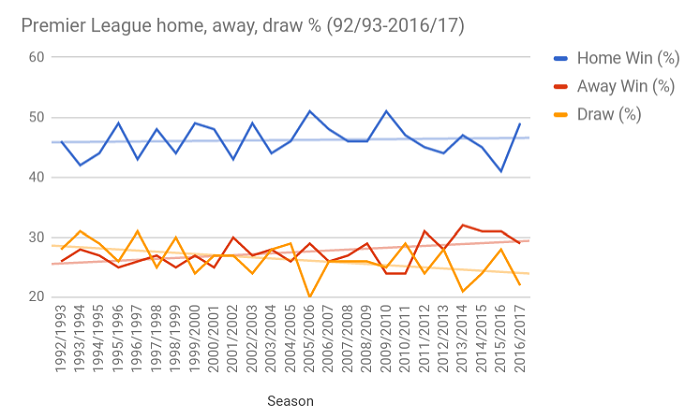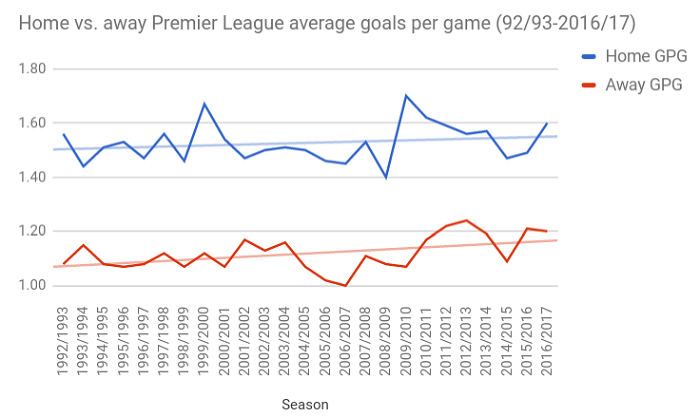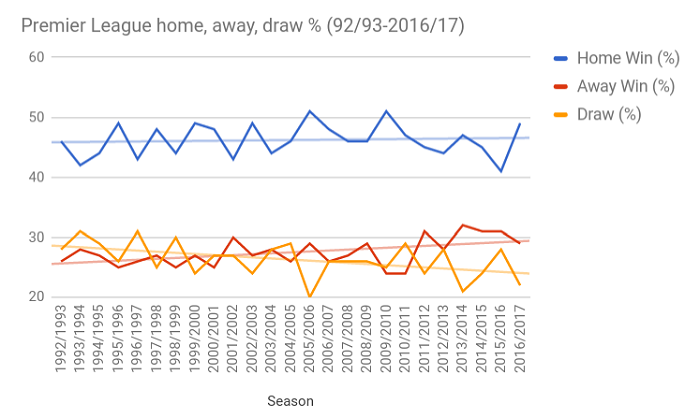What is a home-field advantage? In this article, we’ll explore the impact of home-field advantage, what it means, and how it affects football predictions.
Home-field advantage in football describes a situation where a team performs better when playing at their home stadium as opposed to playing on the road. Studied in football psychology, this concept is recurrent in matches across different leagues and competitions.
Understanding home advantage provides insights into the factors that contribute to a team’s performance in a live match. It can also be used by players and coaches to gain an advantage over their competition.
Does playing football at home give you an advantage? We’ll be answering this question while examining the influence of crowd size, referee decisions, home-field familiarity, and other psychological factors on home-field advantage.
We will discuss recent research on these topics and the implications for coaches and players who wish to exploit home-field advantage.
Read: Analyzing Football Betting Trends To Develop Winning Predictions
Content:
- What is a home-field advantage?
- Home field advantage statistics and data
- How much does home-field advantage matter in football predictions?
- Factors that influence home-field advantage
- How does a football club get a home-field advantage?
What Is Home-field Advantage?
Home field advantage is a term that describes the privileges the hosting team has over the visiting team. This advantage is likened to the psychological effects supporting fans has on competitors or referees.
It can also be attributed to the psychological or physiological advantages of playing close to home in familiar situations. And the disadvantages teams suffer when playing on the road like changing time zones, climate changes, or fatigue from travelling.
Home advantage can also be the match rules that favour the hosting team directly or indirectly.
Home-field Advantage Statistics And Data
Several statistics and data back up the impact of home-field advantage in football.
These stats show a close correlation between home matches and victories. It also indicates that home teams score more goals than away teams.
See them listed below:
1. In the last 10 Premier League seasons, champions won more home matches at a 67% average, compared to 45% of away games won on the way to winning the title.
2. For every home match won by a Premier League Champion, the home crowd was an average of 55,174 compared to an average of 52,936 when a home match was lost.
3. During the 2022/23 Champions League Group stage matches, there were 43 home victories compared to 31 away victories.
4. In the 2022/23 Champions League group stages, there were 146 home goals compared to 142 away goals.
5. In the 2021/22 Premier League season, 55% of the penalties were awarded to home teams, while only 45% were given to away teams.
6. 52% of players from away teams received red cards in the last 5 Premier League seasons.
Gotten from Soofootball.
How Much Does Home-Field Advantage Matter In Football Predictions?
Understanding the impact of home field advantage in Football Prediction is key to identifying value in football bets and creating your football trading odds.
In this part, you’ll learn how to calculate home-field advantage and see the evidence of its influence in football.
Proof Of Home-field Advantage In Football
In case you didn’t know, football teams play better at home than they do on the road or neutral ground. And football has the biggest home advantage factor of any other sport.
A look at statistics from the 2016/17 Premier League season recorded:
- 607 home goals.
- 457 away goals.
- 49.2% of matches were won by the hosts.
- 28.7% of matches were won by the guests.
- 22.1% of games end in a draw.
From as far as 1888 till the present, the home team has always scored more goals and won more matches than the away team throughout the season.
International matches have the same bias too experienced in domestic matches. Two researchers Jim Albert and Ruud H. Koning analysed almost 9,000 matches that happened between 1993-2004.
They discovered that the home sides in international games won 50.5% of games, the away team won 24.5% and 25% of matches ended in a draw. They involved all the registered teams under FIFA in their report. Countries like Spain, Brazil, Germany, France, and Italy displayed a winning rate of over 60% at home.
The impact of home-field advantage is felt by host nations too at the FIFA World Cup. In tournaments from 1930 – 2014, the hosts advanced to the quarter-finals 17 times, semi-finals 13 times, and won 6 times.
History Of Premier League Home-field Advantage Data
To understand the home-field advantage and how consistent it is we found this graph from Smarkets that showed how often a Premier League team wins at home and how many goals they score. And thought to share it with you.
How often do Premier League teams win at home? 
credit: help.smarkets.com
The graph shows home win, draw, and away win percentages for every season since the Premier League’s inception. The consistency across 25 English Premier League seasons has just a 19% differential between home win percentage.
EPL teams win on average about 46.2% of home games, a draw happens 27.52% of the time, and guest teams win in 26.32% of matches.
How many goals can an EPL team score at home? 
credit: help.smarkets.com
Premier League home and away games increased over time; the most rapid growth was in away goals. Despite this, there is an obvious home advantage based on goals scored by the guests and home teams.
Since 1992/93 home teams have scored an average of 1.53 goals compared to the 1.12 goals scored by the visiting team.
How to calculate home-field advantage for football predictions
Statistics may agree that every team plays better at home than on the road, yet it is difficult to create a global home advantage. Mostly because football teams are unbalanced.
To calculate the home-field advantage for a team, use this formula:
- Home-field advantage = (home goals scored – goals conceded at home) / number of home games played in a season.
Here is a live example using Chelsea’s Premier League win in 2017:
- Chelsea’s home advantage = (55 -17)/ 19 = 2.00 goals.
Chelsea won by two goals or higher in 63.2% of their Premier League home-field games that season. This type of data will be useful for bettors using an Asian Handicap market.
Factors That Influence Home-field Advantage
Home-field advantage affects the general outcome of a football match and should be considered during your Football Prediction.
However, this advantage is aided by numerous factors that work on the mental and physical state of football players. It’s those factors that influence the home-field advantage we listed here.
1. Crowd Size
The impact of crowd size/fans on home-field advantage references the relationship between the number of spectators at a home match and the home team’s performance.
Research shows that bigger crowds have a more positive effect on the hosting team’s performance. This is called the ”twelfth man” effect because the fans are counted as an extra player who supports and boosts the home team’s energy.
Home teams score more goals and win more games in stadiums with a larger crowd capacity. They are also more likely to win if they are playing in front of a packed crowd.
Note, the impact of crowd size on home-field advantage may be dependent on the culture, tradition, and long-standing rivalry between two teams.
2. Referee Bias
Referees may often favour the home team in several situations, This can be during close calls or decisions that affect the result of a game.
This favouritism can be in form of giving better calls or awarding more penalties to the home teams or being more forgiving when they make a foul.
Players from the hosting teams are less likely to be sent off the pitch compared to the guests.
Home teams stand a higher chance of enjoying close calls and game-altering decisions.
Referee bias has its implications which could affect the fairness of the game and lead to a lopsided matchup.
However, this situation can be curbed by turning attention to transparency and accountability for decisions made by referees. Referees can also be trained to avoid bias in their judgement during recruitment.
Long-distance travels stress players physically and psychologically. Which is very evident in international games like the World Cup.
Athletes travel to varying time zones rendering them sleep-deprived and jetlagged. They also won’t know where to eat or which foods will suit their palate.
3. Travel Effect
Home teams on their part are comfortable and won’t have to disrupt their sleep schedules to train or participate in matches. This gives them leverage over the visiting team.
4. Home-field Familiarity
Home-field familiarity is an advantage a team has over their opponent by being familiar with the playing area, weather conditions, and field dimensions of their home pitch.
This type of familiarity can significantly affect home advantage in football. Teams that have had more experience playing on a field have better performance in matches.
They know the specific characteristics of their pitch like the size, shape, type of turf, and how weather conditions affect it. This can help them understand better how to play on the field and boost them psychologically.
Teams that play on artificial turf will have an advantage over teams that are used to playing on natural grass. They’ve adapted to the surface and know how the ball reacts to it.
Similarly, they are used to the regional weather conditions and will play better over an opponent which hasn’t adjusted yet.
5. Psychological Factors
The mental and emotional factors that influence a team’s performance are called psychological factors. Psychological factors play a huge role in home-field advantage.
One such factor is crowd noise. The booing of fans creates an intimidating atmosphere for guest teams, which can negatively affect their performance.
In the same way, cheering can boost the home team and give them the confidence to keep playing well.
Team cohesion is another psychological factor that affects home-field advantage. Football clubs with strong cohesion play better because they can work together effectively.
Motivation is another factor that influences hosting teams. When a team is motivated, they play well and draw support from their fans cheering them.
How Does A Football Club Get Home-field Advantage?
There are a lot of ways football clubs get home-field advantage and it all boils down to them playing in familiar terrain.
If you find yourself on a Prediction site for football looking at a fixture for two teams, these are some reasons why you might want to back the home team.
1. Teams Are Comfortable Playing On Their Home-field
Hosting teams feel at peace playing on the home field because it’s accessible and familiar. It could have some irregularities the visiting team wouldn’t know about, but the home team will know.
2. Refrees Extend Some Privileges To The Home Team
The official overseeing the game may favour the home team over the guests. Although they’re not supposed to bias, they’ll want to give the hosts the honour of using their space.
3. Home Teams Are Well-Rested Than Visiting Teams
Home teams don’t need to travel long distances for matches, but visiting teams may travel across the country for a game.
Plus the visiting team will be jetlagged from travelling and be tired during the game, giving the hosts an advantage.
4. Fans Provide Support
The home field is where most of a team’s fans will be, cheering them on and motivating them to play well. This can spur them to show off by scoring a large number of goals just to impress their fans.
5. Territorial Advantage
There is a special kind of mental boost that comes with teams playing on their turf. They can use this mentality to intimidate or subdue their opponents.
Plus there is the factor of familiarity. The home team practices on that field daily, so they are already used to how it works. The guests won’t be familiar with its irregularities and dimensions.
The post Football Predictions: Exploring The Impact Of Home-field Advantage appeared first on Matchplug Blog.











 credit: help.smarkets.com
credit: help.smarkets.com
 credit: help.smarkets.com
credit: help.smarkets.com
